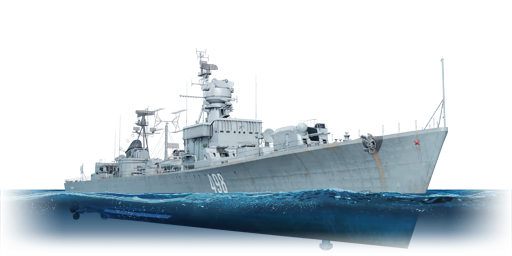


The Neustrashimy was the sole ship of the Project 41 Neustrashimy-class destroyers, the first Soviet post-WWII destroyer design. Neustrashimy was to be a prototype for further series of ships. Unfortunately this never happened as she was deemed too big for serial production. A modified design which resulted in Project 56 (Kotlin class) was chosen instead. The Neustrashimy was also the first Soviet ship to receive a NATO designation as the Tallinn-class. Neustrashimy was laid down on 5th July 1950 and commissioned on 31st January 1955. She was assigned to the Baltic Fleet and served there until 22nd February 1974 when she was decommissioned and sold for scrap.
Neustrashimy was introduced in Update 1.97 "Viking Fury" as a GE premium. Unusually for a destroyer, her bridge is protected by 20 mm thick antifragmentation armour, and her magazines are under the waterline, making them protected from direct fire unless the shells hit from a distance at an angle. Neustrashimy is also equipped with air search and track radar capable of tracking targets up to 150 km away, alerting captains of any incoming air threat in advance. Her four quadruple 45 mm autocannons coupled with HE-VT shells in the main armament can then make short work of any bomber. Neustrashimy is also equipped with two quintuple 533 mm torpedo launchers firing 53-39 torpedoes with maximum speed of 94 km/h and range of 4 km.
Neustrashimy was removed from sale due to the fleet research changes in Update "New Power". It was briefly made available for purchase with Golden Eagles for the 2022, 2023, and 2024 "Russian Navy Day" mini-events.
| Ammunition | Type | Armor penetration (mm) at a distance: | |||||
|---|---|---|---|---|---|---|---|
| 1000 m | 2500 m | 5000 m | 7500 m | 10000 m | 15000 m | ||
| HE | 37 | 37 | 37 | 37 | 37 | 37 | |
| SAPCBC | 206 | 177 | 139 | 109 | 85 | 56 | |
| HE-VT | 35 | 35 | 35 | 35 | 35 | 35 | |
| Belt | Belt filling | Armor penetration (mm) at a distance: | |||||
|---|---|---|---|---|---|---|---|
| 100 m | 1000 m | 2000 m | 3000 m | 4000 m | 5000 m | ||
| HEF/HEF-T | 10 | 8 | 6 | 5 | 5 | 5 | |
10 × 533 mm 53-39 torpedo






 2 x (315 / 600) %
2 x (315 / 600) % 
 2 x 166 %
2 x 166 % 

Seakeeping |
|---|
Unsinkability | |
|---|---|
Firepower | ||
|---|---|---|